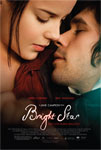The
Curious Case of Benjamin Button
Fantastic Mr. Fox
Gran Torino
Harry Potter and the Half Blood Prince
The Hurt Locker
The
Informant!
Julie and Julia
Milk
The Reader
Serious Man
Film Reviews from 2008
Film
Reviews from 2007
Film Reviews
from 2006
The new film by acclaimed writer-director Jane Campion (The Piano) tells the story of the 19th Century British Romantic poet John Keats and his relationship with Fanny Brawne, a young woman who lives next door. While Bright Star is visually beautiful, it lacks passion, until the very final scenes. I want movies to draw me in from the beginning. Bright Star saves the best scenes for last, when I had all but lost interest. As the film begins, Fanny is drawn to Keats, who initially shows only a passing interest in her. He is consumed with his poetry, and she is seen as a distraction. To complicate things, Keats’ friend and collaborator Charles Brown, does everything he can to keep Fanny from Keats, thinking that she keeps them from their work. As Fanny and Keats begin to show some interest in each other, Keats proclaims that he has no money. Without money, there is no chance of marriage. Keats wonders if the relationship is worth pursuing at all. Bright Star reminded me of the novels of Jane Austen, with characters looking to marry in order to ensure their financial status. Austen’s characters are so concerned about how they come across, so much weighs upon their appearance and the impressions they make in the repressive era they inhabit. What Bright Star lacks is the wit and insight of Austin, who made you care about these characters. Campion’s film is so reserved, it’s hard to feel much of anything about Keats, Fanny, and the other characters in their world. It’s an oddly unromantic film about a great romantic poet.
The patient viewer will no doubt be touched by the tragic end of Bright Star. I wish the entire film had been as engrossing as the last 30 minutes! Then I would be more inclined to recommend Bright Star to those other than the very patient lover of 19th Century Romantic poetry. Tom Condon, OP |
"It’s an oddly unromantic film about a great romantic poet. "
Rated: PG for thematic elements, some sensuality, brief language and incidental smoking.
|



 Bright Star
Bright Star Thankfully, the film does pick up steam as it progresses. Keats and Fanny begin to show more interest in each other, despite the obstacles. At the same time, Keats becomes ill, and Fanny is increasingly worried about his health. At the encouragement of his doctors, Keats decides to move to Italy. It would be improper for Fanny to accompany him, since they are not married. Young Australian actress Abbie Cornish is very good in the final scenes in which Fanny shows the pain of separation from Keats, and her grief when she learns of his death at 25. The emotions she held in so tightly finally come pouring out.
Thankfully, the film does pick up steam as it progresses. Keats and Fanny begin to show more interest in each other, despite the obstacles. At the same time, Keats becomes ill, and Fanny is increasingly worried about his health. At the encouragement of his doctors, Keats decides to move to Italy. It would be improper for Fanny to accompany him, since they are not married. Young Australian actress Abbie Cornish is very good in the final scenes in which Fanny shows the pain of separation from Keats, and her grief when she learns of his death at 25. The emotions she held in so tightly finally come pouring out.